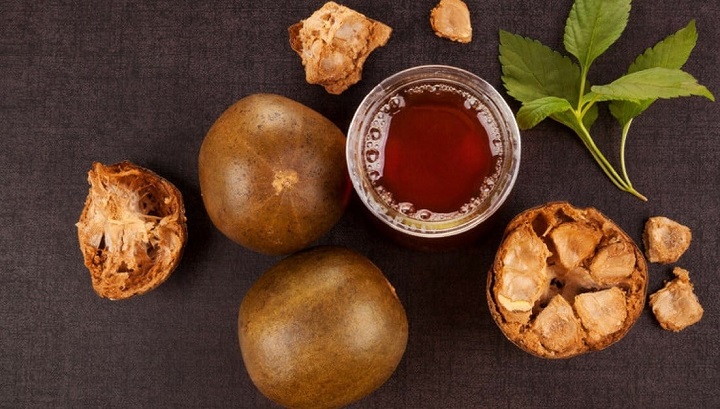Pure Monk Fruit: Natural Low Calorie Sugar Substitute
Keeping tabs on how much calories and sugar you’re ingesting is a very important part of a healthy lifestyle. Especially when you know that added sugars in some drinks, desserts and even candies may lead to weight gain and other health issues. But even if you want to reap the benefits of a low-carb diet, that doesn’t mean you can’t have a sweet tooth. You’ve most probably already heard about and tried some of the natural sugar substitutes. But, there is a new trend that is now making it into the wellness mainstream – monk fruit.
Monk fruit, also known as luo han guo, is a small green melon that grows on a vine and is native to southern China. It has been used for hundreds of years in Traditional Eastern Medicine as a cold and digestive aid, but today people widely use it to sweeten their foods and beverages.
What Is Monk Fruit Sweetener?

This type of natural sweetener is made from an extract derived from dried monk fruit. This extract is 150-200 times sweeter than table sugar and has zero calories and carbs. Only a very small amount of this sweetener is needed to achieve the desired sweetness. Monk sweeteners are usually blended with commonly approved food ingredients. While some a good, others you’d may want to avoid. That being said, if you’re mindful of your health, try to find pure monk fruit sweeteners that contain erythritol (natural sugar alcohol). These organic products will be GMO certified and will not contain artificial aspartame which can be commonly found in sweeteners.
Monk fruit sweeteners are widely used in beverages and foods like drinks, juices, dairy products, desserts candies and condiments. Being stable at high temperatures, monk fruit powder is ideal for baking. Approved as safe for everyone, including children and pregnant women, this natural sugar substitute has multiple benefits.
Monk Fruit Health Benefits
Safe for Diabetics
The sweetness of monk fruit comes from natural compounds called mogrosides. In general, they are safe for people with diabetes as they won’t increase blood sugar levels. Moreover, when you use monk fruit and reduce calories, you may lower blood sugar level and insulin, which leads to an improvement (and possible prevention) in obesity and type 2 diabetes. However, you need to know that not all monk sweeteners are sugar-free, some are blended with other ingredients that may increase carb and calorie counts, affecting the insulin sensitivity.
Helps in Weight Loss

Because monk fruit has no calories, carbs and fat, it might be a great option to maintain a healthy weight. Again, to make the best out of your sweetener, you need to make sure it has no added sugars. However, you may want to save your sweet treats made with monk fruit for special occasions because they’re still made of chocolate of butter.
Fights Inflammation
The monk fruit’s mogrosides are proven to show anti-inflammatory properties and help you fight inflammation in a natural way. Monk fruit has been used for centuries to soothe sore throats, remove phlegm and relieve joint inflammation. The anti-inflammatory benefits of monk fruit may help in the prevention of diseases such as cancer, diabetes, heart disease and depression.
The Downsides
Besides its many benefits, monk fruit has some drawbacks. Firstly, it’s very difficult to find monk fruit fresh. Even then, it’s rarely eaten fresh because it ferments and gets rancid fast after harvesting. Dried monk fruit is more in use, but it’s also difficult to find (unless you visit an Asian market). Knowing that it’s expensive to import and process monk fruit, it’s no surprise that sweeteners made of organic monk fruit are bit pricey and available in fewer options. But when it comes to taste, many people find it pleasant and less bitter than other sweeteners (especially artificial ones).
Tips on Using Monk Fruit Sweetener

You may use your monk fruit sugar substitute to sweeten almost anything. Try adding some into your morning coffee or any other favourite beverage, like tea, ice tea or lemonade. A tasty monk fruit smoothie is sometimes all you need to begin a busy day with. You’ll have a boost of protein and healthy fats and you’ll make it to lunch without feeling hungry. But make sure you pick low carb ingredients as well. Coconut milk, avocado, cocoa powder or any other fruit low in sugar will make a healthy choice for your monk fruit smoothie. Steer it to oatmeal or other hot cereals, smoothies, yogurts, salad dressings and sauces.
If you love baking, then monk fruit might be a carb-free way to sweeten your desserts. You can use it to bake delicious monk fruit chocolate brownies or any other treat you love indulging your senses with. Make it for your family and friends as well – desserts sweetened with monk fruit are as festive as any others!












